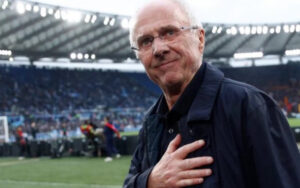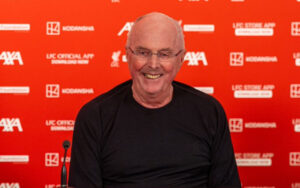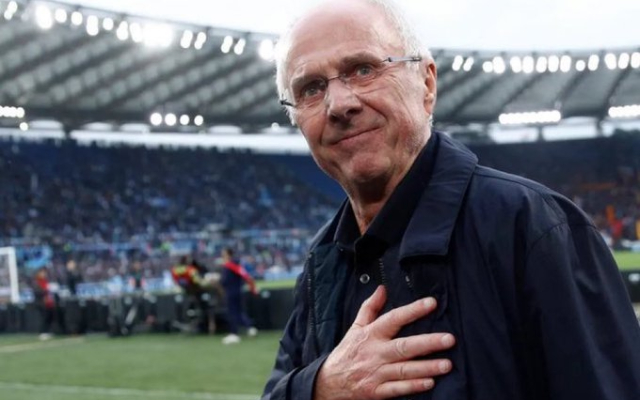
RevSportz Comment
As his managerial star waned, after a succession of underwhelming performances and scandals in his personal life, Sven-Goran Eriksson never lost his smile, or his zest for life. After being diagnosed with terminal cancer late last year, he admitted that his one great regret in life was never coaching his beloved Liverpool. The club promptly invited him to manage Liverpool Legends in a game last March, and there wasn’t a dry eye in the house as the ailing Eriksson soaked in the acclaim from the crowd that he had longed to be part of ever since he first watched Bill Shankly’s Reds with his father as a boy in Sweden in the 1960s.
For a new generation of football fans, that was their first exposure to ‘Svennis’, as his family and friends called him. But older generations will remember just how good a coach Eriksson was in his heyday, winning league titles in Portugal and Italy, and lifting three of the four European club trophies in existence back then.
Those were not perfunctory triumphs either. Winning the UEFA Cup with IFK Goteborg in 1981-82 was as improbable as strolling up Everest without oxygen, and the Serie A triumph with Lazio 18 years later marked only their second (and last) national title. With that magnificent Lazio side, he also won the Cup Winners’ Cup and the Super Cup. Only the European Cup, the biggest prize of all, eluded him, with his Benfica side losing 1-0 to Arrigo Sacchi’s all-time-great AC Milan team in 1990.
The beauty of the football that Lazio played – with Alessandro Nesta in defence, the likes of Juan Sebastian Veron, Roberto Mancini and Pavel Nedved in midfield, and a fearsome forward line of Marcelo Salas and Christian Vieri – played a big part in Eriksson being the first foreigner to be offered the England job after a tearful Kevin Keegan resigned following a 1-0 loss to Germany at Wembley in a World Cup qualifier.
Eriksson inherited what many thought was English football’s golden generation, and it didn’t take him long to make a mark. Even now, nearly a quarter century on, that match remains English football’s high watermark after the 1966 World Cup triumph. England may have reached the final at consecutive European Championships – beaten by Italy in 2021, and by Spain earlier this summer – but neither achievement created anything like the seismic shockwaves that emanated from Munich’s Olympic Stadium on September 1, 2001.
For the Latest Sports News: Click Here

Germany had never lost a World Cup qualifier at home. Never. And while England’s campaign had stuttered, the Germans were well on course for the World Cup to be jointly held by Japan and South Korea. When Carsten Jancker scored in the sixth minute, after England’s defence parted like the Red Sea, the raucous crowd expected a repeat of the Wembley humiliation nearly a year earlier.
But six minutes later, with Germany trying to play offside following a David Beckham free kick, Michael Owen ghosted into space and was found by Nick Barmby’s knock-down. The finish was typical Owen, cold-eyed and unerring. After that, the teams traded blows for much of the first half before the game turned in the final seconds before the interval.
Another blocked Beckham free kick, a cross from his left foot that Rio Ferdinand knocked down, and a stupendous half-volley from Steven Gerrard that nestled into the far corner. Still though, no one dared to dream.
But early in the second half, Owen, who would go on to win the Ballon D’Or, latched on to a cushioned header from Emile Heskey, another Liverpool teammate, and smashed the ball past Oliver Kahn’s left glove. Six minutes past the hour, Gerrard found him with a lovely through ball. Same result, as Kahn picked the ball out of the net.
The German embarrassment wasn’t complete. In the 74th minute, Paul Scholes ventured upfield and slid the ball through to Heskey. He would eventually title his autobiography Even Heskey Scored. Germany would never again play at the Olympic Stadium.

How ironic then that 10 months later, it was Germany that lost the World Cup final to Brazil, with England having lost to the Selecao in the last eight. The quarter-final hurdle was one that Eriksson would never surpass, with defeats to Portugal at the same stage of Euro 2004 and the 2006 World Cup.
Many blamed his tactics, and him being in thrall to the stars of the day. But others, including Ferdinand who played for him, have admitted that the team environment was never right, with Manchester United and Liverpool players markedly reluctant to fraternise.
By then, Eriksson had made the wrong kind of headlines thanks to tabloid stings and lurid stories about his love life. But they never made him grim or bitter, and even his final messages after his diagnosis were full of positivity and warmth.
Once the dust settles and with the fullness of time, Eriksson will be remembered for what he was, a quite outstanding club manager, who didn’t have the luck he needed to land the biggest trophies of all.
Also Read: Record Paralympic medal haul only way to change the media narrative




